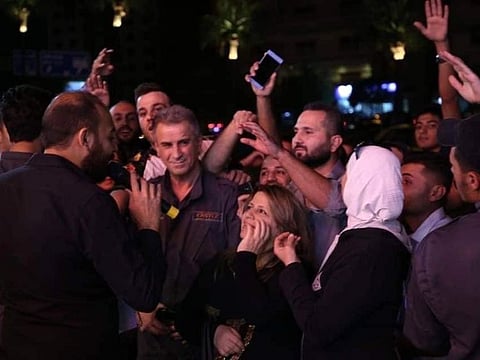Impoverished Damascus one of the first cities in Middle East to retail new iPhone 12
Price of new iPhone is equal to 38 years’ salary for average government employee

Damascus: On October 24, it was announced that the iPhone 12 Pro has reached Damascus — making it one of the first Middle Eastern cities to offer the high-end smart phone, despite international sanctions and Washington’s newly-imposed Cesar Act. Internationally priced at $800-$1,999, the phone is selling in Syria at an astronomical retail price of 5.5 million Syrian pounds ($2,291), with no Apple warranty. In neighbouring Lebanon, the phone is priced at $1,200.
The announcement, made by the upscale phone distributor Emmatel, has raised eyebrows in Syria, where minimum wage stands at no more than 48,000 SP ($22). Higher salaries can reach up to anywhere between 100,000-150,000 SP ($45-68), but they are still no match for the expensive gadget, especially in light of the rapidly depreciating local currency. Currently one US dollar equals 2,200 SP, up from just 600 SP one year ago. Meaning the price of a new iPhone is equal to 38 years of a government employee’s monthly salary.
The owner of Emmatel, Abu Ali Khodor, was recently slapped with US sanctions, which seemingly, did not prevent him from purchasing and selling Apple’s most expensive handset. Emmatel’s announcement came just 10 days after Apple’s own announcement and one day after the phone was officially released in Great Britain.
As the moneyed elite stand in line to purchase the new smart phone on Mezzeh Autostrade, other Syrians are standing nearby in long ques to buy bread and fill their cars with gasoline. Both commodities have been in sharp shortage since late September, with the government recently rationing the amount of subsidised bread that a single family can obtain: no more one pack (1,200 grams) for a family of two. A family of seven and above gets a maximum number of four packs/day. Long queues are also expected for heating fuel, ahead of the winter.
Adding to the misery of ordinary Syrians were the bankruptcies that resulted from three months of COVID-19 related lockdowns, which forced approximately 25 per cent of businesses to close. Another 45 per cent have downsized the work, due to COVID-19.
“Iphones are not for us” said Abdul Karim Radwan, a private sector employee who works at a pharmaceuticals company in Damascus. “What’s wrong with my old phone?” he asked Gulf News, pointing to an earlier generation Nokia. “It rings and takes calls, and that’s enough for me.”
Since their first launch in 2007, iPhones have never been popular with grassroots Syrians, due to their high price. Even before the war started in 2011, they were unaffordable to most people, who often preferred using Android smart phones that require no Apple ID for the purchase of apps, and which cost less on the Syrian market. Yet most Syrian state-media and social media networks take great pride in the fact that Apple’s co-founder Steve Jobs is the son of a Syrian emigrant to the United States named Abdul Fattah Al Jandali, a native of Homs.
“Salaries were never high in Syria,” said Rana, a Master’s student at Damascus University. “But in the past, people didn’t feel that much because there was nothing to buy in Syria.” Luxury items and foreign commodities were lacking throughout the 1980s and 1990s, and only became available during the years 2000-2011. Speaking to Gulf News, she added: “Now with all these gadgets available, a sense of deep deprivation is emerging in society, especially among young people, who want to be part of the new world, and yet they cannot afford it. I fear that those who cannot afford will resort to theft or prostitution to buy these gadgets. It will increase the rift between those who can buy — and those who are dying from hunger.”
Sign up for the Daily Briefing
Get the latest news and updates straight to your inbox







